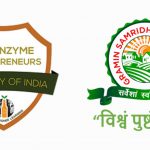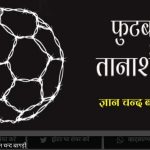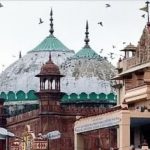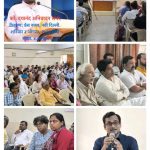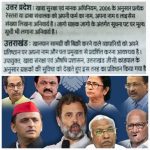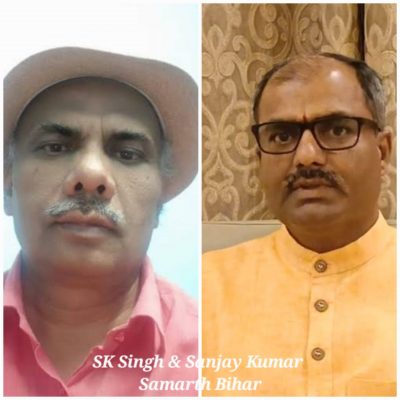
जागो बिहार जागो पार्ट- 4, बख्तियारपुर का नाम बदलो "आचार्य राहुल भद्रसेन नगर" करो
A committee has been formed to examine the possibility of a system of “One Nation, One Election”, under which simultaneous elections would be held for the Lok Sabha and State Assemblies. The present committee, headed by former President Ram Nath Kovind, will be the fourth to examine the possibility of simultaneous elections. Earlier, the prospect was discussed by the Law Commission, NITI Aayog, and a Parliamentary Standing Committee.
The government notification mentioned “Whereas elections to the house of people and legislative assemblies of states were mostly held simultaneously from 1951-52 to 1967 after which this cycle got broken and now, elections are held almost every year and within a year at different times which result in massive expenditure by the Government and the other stakeholders, diversion of security forces and other electoral officers engaged in such elections from their primary duties for significantly prolonged periods, disruption in developmental work on account of prolonged application of model code of conduct, etc..”
The Government spokesperson narrated “Once the committee comes up with a report, it will be placed in the public domain and a discussion will be held. When the report comes to parliament, it will be discussed in parliament as well. There is nothing to be nervous about, as discussions will be held. We are the world’s largest democracy and we are known as the mother of democracy. This is the evolution of democracy in the mother of democracy,”
It has been argued that the practice of simultaneous elections of Loksabha and State assemblies continued till 1967, due to the premature dissolution of some state assemblies in 1968 and 1969, the system of simultaneous elections was disrupted. since the 1967 elections, The practice of simultaneous elections to the Lok Sabha and the Vidhan Sabhas could not be maintained and the elections have still not been realigned so far.
It is not a surprise if this move is viewed in the political context because when the Modi government came to power in 2014, simultaneous elections have been on the agenda. The Modi government has already constituted three separate committees to look into the possibility of having a system for “One Nation, One Polls”. What surprised the public is the timing of the announcement of this Committee as the General elections are scheduled in April/ May 2024 and debate on this “One Nation One Poll” proposition starts just 6-8 months before the General election 2024. It could have been better if the Government would have set up this committee and started the debate in 2019 just after getting power at centre.
In his 2019 Independence Day speech, Modi said after the government had achieved ‘one nation, one tax’ through the Goods and Services Tax, “there are now demands of “one nation, one election”. In August 2018, the Law Commission of India released its draft report on simultaneous elections. According to constitutional experts, the Law Commission draft report noted that simultaneous elections cannot be held within the existing framework of the constitution. In order to conduct such simultaneous elections, it said that appropriate amendments are to be made in the constitution, the Representation of the People Act 1951, and the Rules of Procedure of Lok Sabha and state Assemblies. In August 2018, the Law Commission of India released its draft report on simultaneous elections. It also said that at least 50% of the states should ratify the constitutional amendments.
If this move is analyzed objectively on neutral ground, it scores merit as the whole nation is busy in some or the other part of India in conducting elections and all the development work come to a complete halt. If politics is seen as a profession then it has to stand and pass in scrutiny in some of the well defined objectives of getting people mandate for governance and discharge duties meaningfully for the period mandate is provided. In the present scenario political parties are not acting professionally in discharging their duties and adding value to governance, rather they are trying to influence one election at the outcome of the other, which is not fair in true spirit of democracy.
It may seem impractical to conduct all the State Assembly elections in one go with LokSabha election, but if a middle path is followed at least half of the state assemblies elections can be conducted with the Loksabha elections be preponing and postponing few of the assembly terms for few months. For example the state assembly elections of Rajsthan, Madhya Pradesh, Chhatisgarh, Mizoram and Telangana are due in December 2023. Similarly state assembly elections of Sikkim, Haryana, Maharashtra and Jharkhand are due in April, October and Nov/ Dec 2024 respectively. If this concept of one nation one election is implemented these 10 state assembly elections can be conducted simultaneously with proposed Loksabha election of 2024 scheduled in April/ May 2024.
It is apparent now if One Nation One election is not possible, then at least One nation two elections (in a span of 5 years) seem pragmatic in the context of India keeping in view its vast area and demography. Nonetheless at the expense of the tight mindset of free flowing election schedules we can not keep the development work at ransom. Some of the merits of One nation One election can easily be counted as ..Cost savings, stable governance, efficient resource allocation, reduced voter fatigue and enhanced policy focus.
The Challenges of One nation, Once election can be in terms of meeting Logistics and Administrative needs, fulfilling constitutional and legal hurdles, impact on regional parties and information overload. Public opinion is crucial in meeting this aspiration and Government should not exhibit its actions in hurry and this should be allowed in public debate and collecting the data of public mood through survey. Moreover States in India have varying political dynamics and concerns, and any move to synchronize elections must respect their autonomy and diverse interests in the framework of federal structure.
Samarth Bihar welcomes the move of “One nation, One Election” and suggest to make it more pragmatic in approach of “One nation, two elections (in a span of 5 years)”

